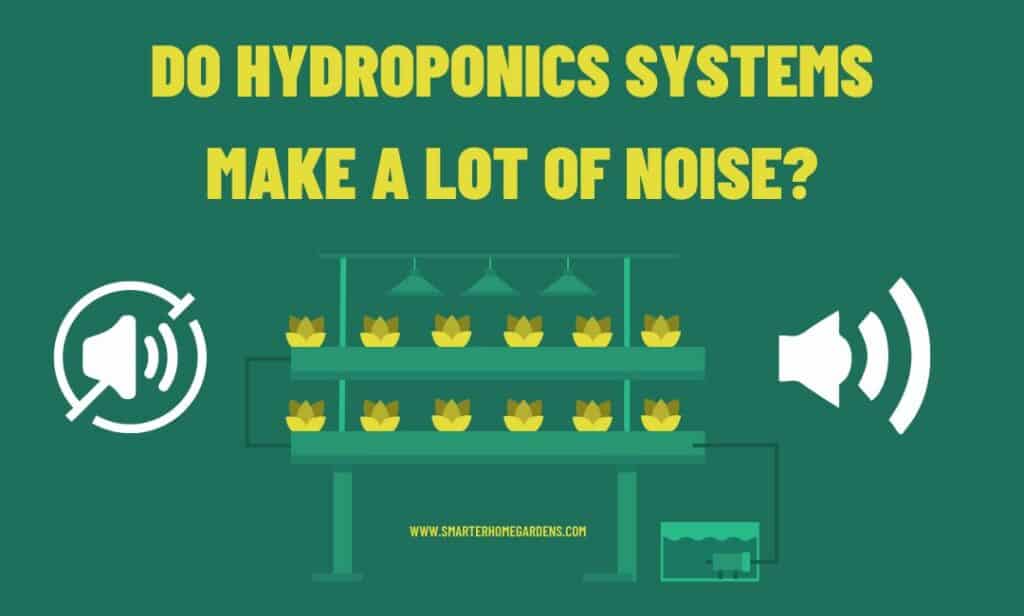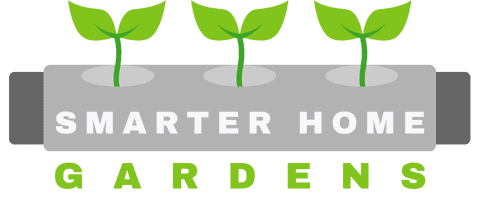This contains affiliate links. As an Amazon Associate, SmarterHomeGardens.com earns a small commission from qualifying purchases at no extra cost to you.

Most types of hydroponics systems have either an air pump or a water pump to aerate the nutrient solution and pump it through the system. As a result, gurgles, hums, growls, and even drips as the pumps do their job is completely normal and should be expected.
But are these noises loud enough to disturb you? And is there anything that you can do to minimize the noise from your hydroponics system?
As a general rule, a well-functioning hydroponics system should not be loud enough to disturb you. However, issues with the pump’s position or the pumps themselves, contact with fixtures, blocked airstones, and diaphragm defects can all cause your hydroponics system to become noticeably noisy.
Thankfully, you can solve any noise issues easily enough once you identify its root cause. Let’s explore more about these causes and their respective solutions below.
Do Hydroponics Systems Make a Lot of Noise?
Understanding the source of noise in your hydroponics system
There are two primary sources of noise within most hydroponics systems. These are:
- The water pump – The pump is responsible for pumping water to the plants and is essential for proper plant growth. Water pumps can be noisy, especially when they are underpowered or overworked.
- The aeration system – This system is responsible for introducing oxygen into the water and is often necessary for the health of the plants. Aeration systems can become noisy if they are poorly maintained or if the water is not being filtered properly.
Combined, they are responsible for 90% of the notice you might find coming out of a hydrponics system. So, it’s critical that you understand them, buy good quality equipment, and know how to properly maintain them to avoid any performance or noise issues.
Aside from the pump and aeration system, other sources of noise include the tricky of water (which I find quite pleasant), and the gentle clicking of any hydroponic plug timers you might be used to regular the flow of electricity into your system.

If you are using an air conditioning unit or a heater to control the air temperature around your hydroponics system, these too can create additional noise.
Common problems that can cause extra noise in hydroponics
1. The quality of your equipment
One of the leading causes of excessive noise within hydroponics systems is poor-quality equipment. The market is now flooded with cheap quality pumps from China. Most are only suitable for small aquariums, despite being advertised for hydroponics. I suspect in an effort to tap into the growing trend.
My advice is to do your research. And, if you can, buy proper pumps from reputable manufacturers and those which are designed for use in hydroponics.
A great option is the General Hydroponics HGC728040 Dual Diaphram Air Pump which is both powerful and quiet. It’s one of the few pumps that are manufactured specifically for use in hydroponics.
I wrote an article about hydroponic air pumps which you can read at this link. I also made a few recommendations for specific pumps which you can buy on Amazon, should you wish.
2. Pump size
The bigger the air pump, the louder it will be. This is because it has bigger internal parts, specifically the diaphragm, where the vibrations come from. The best solution for this is to get a smaller hydroponic air pump, especially if your hydroponics system doesn’t require a heavy-duty pump.
I’ve written a helpful guide on how to choose the correct pump size for your hydroponics system.
3. Contact with fixtures
When the air pump comes into contact with a hard material such as metal pipes, plastic housing, and other fixtures, the slight vibration can create excess noise. The simple solution here is to place the pump over a soft surface or invest in some rubber leg caps that can better absorb the vibrations.
4. Blocked air stones
The air stones are quite possibly the most common cause of loud noise in hydroponic systems. Air stones get dirty and clogged, leading to airflow restriction. As a result, the air pump has to push more air and use more force, resulting in noise.
You can prevent this by cleaning the air stones regularly. Simply add a 1/3 bleach and 2/3 water solution for 24 hours and then flush with clean water and let them dry.
Speaking of clogging, be sure also to check other air pumps accessories like the hose and valve regularly. You can use a small wire brush and hot water to clean these parts.
Air stones can also make noise when in contact with a hard surface. Prevent this by simply placing a rubber mat beneath the reservoir.
5. Faulty pump diaphragm
A pump’s diaphragm works harder than any other part of the pump and it’s the most crucial. If you have checked all other possibilities, the issue may be a worn-out diaphragm which can cause excessive noise. If the diaphragm is working out, you will likely need to replace the pump.
6. The water hose is too narrow
It’s a scientific fact that a reduction in pipe diameter results in higher velocity and increased pressure. This means hydroponic systems with narrow pipes tend to make more noise. The solution for this is simple, get a hose that has a bigger diameter.
Alternatively, cut the hose short to reduce the traveling time for the air to move to the water’s surface. But make sure not to cut it too short so that you can’t use it!
Which type of hydroponics system makes the most noise?
There are many different hydroponics systems. I’ve written a detailed article about them, including diagrams, in another article which you can read here if you are interested to learn more.
Quiet hydroponics systems
Two of these, namely the Kratky method and the Wick system, do not use any kind of pump which means they are absolutely quiet. They are what we call ‘passive hydroponic systems’ because they have no moving parts or use no electricity. Because of this, they don’t tend to make any noise at all.
Noisier hydropnics systems
Aeroponics
Aeroponic systems, such as my own Tower Garden, do not use an air pump, so any noise issues related to this are eliminated. However, they do use a reasonably powerful water pump which can make a small noise when operating. The pump is usually only switched on for part of the day, however, so disturbance is pretty minimal.

Ebb and Flow (Flood and Drain)
The Ebb and Flow method of hydroponics makes the most noise because the air pump is below the water surface and gets clogged fairly regularly. The piping in this system also overworks, and they get blocked often and can cause additional noise.
Nutrient Film Technique (NFT)
The Nutrient Film Technique can also get noisy because it’s a complicated system with a number of moving parts. First, the pump pushes air upwards, and it has to be a powerful pump. Second, this system requires everything to be at a certain angle, and if you get this wrong, problems arise that can lead to additional noise. Thankfully, you don’t actually need an air pump to aerate the solution at all times because the roots are partly suspended in the air.
Final considerations
Hydroponic systems that use a water and air pump make some degree of noise. Some are louder than others, depending on the type of pump used and how it’s positioned. If you plan to have a hydroponic system indoors where you live, consider the Drip system, besides the passive hydroponic systems. It is fairly quiet, easy to set up, and doesn’t take up much space. Maintaining the air stones and the pipes is also crucial to ensuring the system works well without noise.
Related articles
- Do you need a hydroponics plug timer?
- How long should a hydroponics air pump run?
- How much air do hydroponic plants need?
